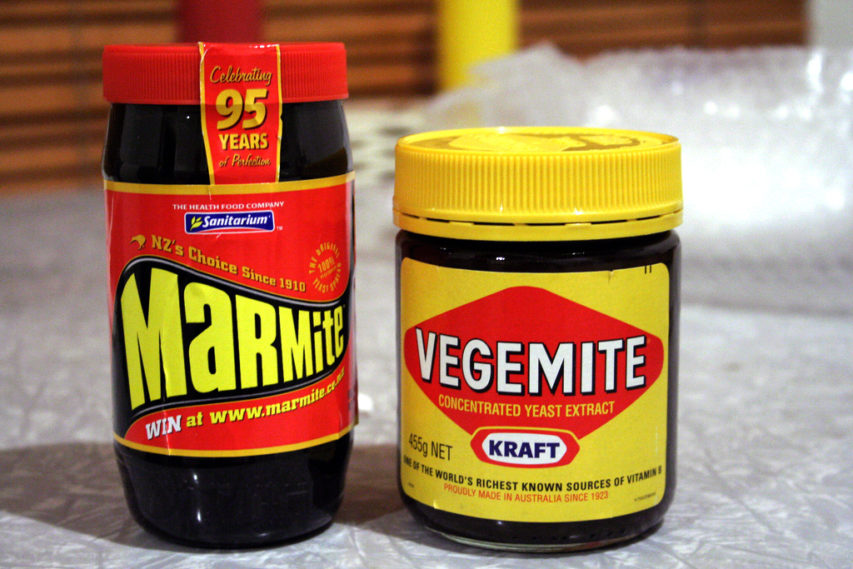Atomic Shrimp
Published 20 Mar 2021More Marmite – I couldn’t get hold of a jar of this for the group tasting last week, but here it is now!
Here’s the previous video: https://youtu.be/MjrBTcnnK6c
September 14, 2022
Marmite Dynamite Limited Edition — Tasting (Also Re-Tasting The Others, With A Spoon)
April 28, 2022
Why yeast extract is in tons of foods (and why it’s delicious)
Adam Ragusea
Published 13 Dec 20212008 paper in which Turkish scientists found 50ºC for 24 hours is the best time and temp for yeast autolysis: https://www.researchgate.net/publicat…
1916 paper in which American scientists found that yeast extract cured beriberi in pigeons fed only white rice, because B vitamins: https://www.google.com/books/edition/…
1995 book chapter covering Justus Von Liebig’s experiments with yeast extract: https://www.google.com/books/edition/…
2002 press release from the Marmite company covering their history (much more thorough than what’s currently on their website): http://webarchive.loc.gov/all/2002111…
Vegemite. There, I said it.
January 11, 2022
Camden Town Marmite Ale – Weird Stuff In A Can #156
Atomic Shrimp
Published 25 Sep 2021Beer, made with Marmite, which itself is made from the yeast left over when beer was made. Marmite is savoury; beer usually isn’t. This is a weird idea whichever way you look at it, but how does it taste?
From the comments:
Atomic Shrimp
8 hours ago
Afterthoughts & Addenda
uR pOuRiNg iT aLl wRoNg!!! – really? Fine – this might not be a professional perfect pour, but this is *not my first ever beer*. I don’t claim to have any kind of professional technique, but this amount of head is not normal for this method of pouring. Note the copious foam emitting from the can when it is first opened.
October 26, 2021
What is Marmite?
Atomic Shrimp
Published 13 Mar 2021I used Marmite to flavour gravy in a previous video — loads of people asked what it was. Here (I hope) is the answer you need.
I’ve tried — and liked — both Marmite and Vegemite and I have a very slight preference for Marmite, but now I’ll need to search for the reduced salt and XO versions … for science, of course.
July 27, 2018
QotD: All pizza is local
When it comes to pizza, you like what you like; and the weird regionalized nature of pizza suggests that we are most likely to like what we know. Real travellers are aware that it is almost impossible to anticipate what you might get ordering pizza outside its twin cultural homes of Italy and North America. Try it in the U.K.: any sort of two-dimensional horror might materialize. Is that yogurt? Endive? Are those eggs? To the depraved British, it makes sense, like Marmite.
Colby Cosh, “The Edmonton pizza hypothesis”, National Post, 2016-10-03.
October 15, 2016
Unilever attempts to “draw the longbow” over Marmite
Marmite, an almost uniquely British product, is in the headlines this week over an attempt by manufacturer Unilever to jack up prices due to the drop in the pound against the Euro. As Tim Worstall points out, this is not in any way justified because all of the inputs to the product are produced in the UK (that is, the input prices have not significantly changed regardless of how the pound is doing in terms of the Euro exchange rate):
Personally I love the stuff but even in Britain that puts me in a distinct minority.
The other amusement though comes from the action itself. For what Unilever is doing here is what we in Britain refer to, colloquially, as “taking the piss.”
Yesterday, the implications of the pound’s fall on prices and retailer margins hit home for the wider public as the country’s leading supermarket engaged in a war over prices with its highest-profile supplier of branded goods.
Either UK consumers will eat store-branded yeast extract, or they’ll pay more for Marmite, or the impact of the pound’s fall will be shared between supplier and retailer.
This is superficially plausible. Britain imports some 40% of its food and as a result of the Brexit vote the pound has fallen against other currencies. We would therefore expect to see some price rises in food items. Obviously in those imported that have to be paid for in that more expensive foreign funny money. But also in certain domestic foods which substitute for those foreign ones. So, for example, if foreign chicken rises in price then so too will British chicken as demand for it rises–people will substitute away from the more expensive foreign muck to the purer and more delightful domestic production.
However, this really doesn’t hold for Marmite.
Consumer goods giant Unilever has been accused of ‘exploiting’ British shoppers by withdrawing more than 200 much-loved products from Tesco after the supermarket refused to agree to its 10 per cent price hike. Critics claim the world’s largest consumer goods manufacturer, which makes an estimated £2billion profit a year, is ‘using Brexit as an excuse to raise prices’. The Anglo-Dutch firm, which heavily campaigned against Brexit, claims it has been forced to increase prices as a result of the falling value of the pound in the wake of the referendum.
The reason it doesn’t hold for Marmite is because it is not imported and nor are any close substitutes in any volume. Thus Unilever’s costs have not gone up in any manner at all over this. Quite the contrary in fact, the only flow, other than trivial amounts of Vegemite an Australian version of a similar thing, is of Marmite out of the UK. Meaning that Unilever’s profits on Marmite exports have risen as a result of the pound’s fall. Their costs, revenues and margins in sterling are exactly what they were for domestic sales before that slump in the pound.
The row is said to have developed when Unilever – which says it faces higher costs because of the fall in sterling – attempted to increase wholesale prices.
It’s simply not true thus the micturation extraction.
October 19, 2012
Vegemite: it’s not just Australian for Marmite
BBC News celebrates the 90th birthday of that uniquely Australian spread, Vegemite:
Vegemite started as a wartime substitute for Marmite, but it’s now as symbolic of Australia as Sydney Harbour Bridge and the koala. How did this salty spread become so popular?
What’s the link between German U-boats, the beer industry, processed cheese and the Men At Work’s 1983 hit, Down Under?
The answer is, they all played a part in turning Vegemite from a humble yeast spread into an Australian icon. Stop any Aussie on any street, anywhere in the world, and they will have a view on Vegemite – for, or against.
Now, on the eve of its 90th birthday, the first official history has just been published. The Man Who Invented Vegemite is written by Jamie Callister, grandson of the man who created it.
[…]
Walker put Callister on the case in 1923, and by the end of the year, the pair were confident they had a finished product. Walker decided to launch a competition so the public could name it and claim a £50 prize. Hundreds entered and it was Walker’s daughter Sheila who pulled the word Vegemite out of a hat.
Like the product itself, the name stuck. But sales were sluggish.
Walker had heard about an ingenious Canadian called James Kraft, who had perfected what came to be known as processed cheese. It was a sensation, as it allowed people who couldn’t afford fridges to store cheese for much longer periods.
In 1924, Walker met Kraft in Chicago. The two men got on well and Walker persuaded Kraft to grant him rights to sell his cheeses in Australia.
[…]
As World War II unfolded, Vegemite became associated with the national interest. Posters put up in Australia had pictures of it with the slogan, “Vegemite: Keeping fighting men fighting fit.”
For Vegemite, the war was a turning point, marking its entry deep into the hearts and consciousness of the Australian public.
March 20, 2012
New Zealand facing “Marmageddon”
Oh, the Marmanity!
An announcement by New Zealand’s leading manufacturer of the black sandwich spread, Marmite, has sparked “marmageddon” fears among Kiwis.
Food company Sanitarium said on its website that supplies “are starting to run out nationwide” after “our Christchurch factory was closed due to earthquake damage”.
Even Prime Minister John Key said he is rationing his personal supply.
[. . .]
“Supplies are starting to run out nationwide, and across the ditch in Australia. We know that we will be off shelf for sometime but we are doing everything we can to minimise how long,” the company said.
“Don’t freak. We will be back soon!”
Of course, the announcement set off a buying-and-hoarding frenzy, making the situation all the more dire. But not to worry: supply and demand has already set in — prices are rising to help even out the distribution of the remaining stocks.
November 29, 2011
Oh, the jarmanity!
The Reg reports a terrible traffic accident in Yorkshire:
A flood of yeast extract has blocked the M1 motorway in South Yorkshire after a truck containing the Marmite ingredient crashed and spilled its load.
The road is still closed this morning, according to the latest traffic information, as cleanup workers scoop 23.2 tonnes of the gloopy brown stuff off the road surface.
[. . .]
The dumped yeast extract was described as “waste” by the BBC, so is highly unlikely to now end up in Marmite jars.
Left uncleaned, the vitamin-rich syrup, packed with denatured yeast cells, could cause a minor biohazard as it is highly nutritious to bacteria cultures.
June 5, 2011
The Marmite affair hits Port Hope
Apparently the bureaucratic reach of Danish food nannies now extends as far as Port Hope, Ontario. I dropped in to the British Pantry to stock up on my usual assortment of pickled onions, crisps, toffees, and floral gums, to discover that not only did they not have any Marmite, they couldn’t get any more. This is serious . . . food DefCon Three level serious.
A quick interrogation of the sales person revealed that this is due to some strong disinformation activity on the part of the anti-Marmite faction: “Oh, we can’t bring that in anymore because it’s got beef extract in it. We’re not allowed to import that without a beef importing permit.”
My (sadly) empty jar of Marmite proclaims on the front that it’s 100% Vegetarian:

100% Vegetarian
Ingredients: Yeast Extract
Salt
Vegetable Extract
Niacin
Thiamin
Spice Extracts (contains Celery)
Riboflavin
Folic Acid
Vitamin B12
May 29, 2011
More on the Anglo-Danish Marmite affair
Colby Cosh rounds up the details on the Marmite affair:
Nothing stirs the blood of the British like a nice slapfight over European regulation, and this goes double when food is involved. The UK press has found its latest excuse for tut-tutting and finger-waggling in the unlikeliest of places: at the bottom of the squat, distinctive little jar in which the vile breakfast spread Marmite is sold. This week, English-language journals in Denmark reported that the Scandinavian kingdom’s food regulator was having the dark brown yeast extract cleared from the shelves of shops which serve Brit expatriates.
The British reared up as one, displaying a spirit of indignant unity. “What have the Danes ever done for global cuisine?” thundered the Belfast Telegraph, breaking Godwin’s Law into splinters over its knurled Ultonian knee. (Unfortunately, a good answer might be “Not given it Marmite, at any rate.”) Fans of the quasi-foodstuff gathered on Facebook to form a “Marmite army”. Social campaigners used the ban to call attention to dubious patches in Denmark’s record on human rights and environmentalism.
As he points out, nobody at the Danish food nanny office suddenly issued a ban: technically Marmite had never been cleared for import at all. So it’s just a matter of filling in a form or two and Bob’s your uncle? Not quite:
Marmite’s status as a “fortified food” has apparently only just been noticed, and the DVFA says that “it has not received an application for marketing in Denmark of Marmite or similar products with added vitamins or minerals.” A glance at the DVFA’s procedure for obtaining approval to market these foods reveals why brand owner Unilever might not be in such a hurry to file. (And it also reveals that free-trade fanatics like me should probably rein in their admiration for the EU’s trade barriers just a little.) The agency not only requires compliance with EU-wide regulations, but insists that each product pass an “individual risk assessment” performed using a made-in-Denmark scientific procedure.
May 26, 2011
The Danish Marmite affair thickens
Lester Haines has the latest on the plight of ex-pat Brits suffering under a dictatorial food regime in Denmark:
According to this official statement, neither Marmite nor its Oz rival Vegemite are banned in Denmark, because they’ve never actually been approved for sale.
A 2004 law controls the distribution of products with “added vitamins, minerals or other substances”, and in order to punt such foodstuffs, they “need to be approved by the Danish Veterinary and Food Administration before the product can be marketed”.
[. . .]
In effect, then, those shops selling Marmite are dealing in unauthorised enhanced substances.
We and the Daily Mail have no doubt that any attempt to legalise Marmite would be met with a swift rejection, in defiance of EU directives on free trade. As Copenhagen-based expat Lyndsay Jensen put it: “They don’t like it because it’s foreign. But if they want to take my Marmite off me, they’ll have to wrench it from my cold dead hands.”
It’s been said that Marmite is an “acquired taste”, but Denmark’s health regulators are moving quickly to ensure that Danes never have the opportunity to develop that taste. Of course, like most other forms of prohibition, it might actually increase the attractiveness of the “forbidden fruit”.
Denmark has a long coastline, so smuggling in the little black jars across the North Sea would be quite possible . . .
May 25, 2011
Denmark moves to save its citizens from Marmite
Danish diners will no longer be subject to the horrors of Marmite, thanks to swift and decisive action by the country’s Veterinary and Food Administration:
According to the advert, you either love it or hate it. As far as Marmite goes, the Danish government hates the stuff. That at least is the conclusion that many foreigners have drawn following a ban on the sticky brown yeast extract.
The sales ban enforces a law restricting products fortified with added vitamins. Food giant Kellogg’s withdrew some brands of breakfast cereal from Denmark when the legislation passed in 2004, but until now Marmite had escaped the attention of Danish authorities.
“What am I supposed to put on my toast now?” asked British advertising executive Colin Smith, who has lived in the country for six years. “I still have a bit left in the cupboard, but it’s not going to last long.”
I celebrated the decision by having some Marmite on crackers for lunch yesterday. More for me!
Update: “Let the rise of the Marmite Army begin!”:
“Spread the word, but most importantly spread the Marmite,” wrote Kelly. “On every street in good old Denmark, show ’em what they’re missing after they’ve banned this iconic product from our supermarket shelves! Make it a Marmite day everyday folks! Let the rise of the Marmite army begin!”
But even on the page, opinion remained divided. A perplexed Ray Weaver wrote: “but… it’s horrible…”
On the page calling for a boycott of Danish goods, fan Joe Figg feared the ban could have far-reaching consequences. “This dastardly move could bring about global warming of toast,” he wrote. While Mark Salisbury wrote: “Down with spread fascism!”
March 2, 2011
January 7, 2010
Marmite versus Vegemite
Charles Stross has run out of things to post that will rile up the reader base, so he finds another way to get the chattering masses chattering — by declaring his unnatural love for Marmite and Vegemite:
Note to American readers: Marmite is what I (being a Brit) grew up with. If you brew beer on a commercial scale, when you drain the fermenting vessel you end up with a scum of dead and dying yeast cells on the side. Some time in the late 19th century, rather than treating this as waste, some nameless genius had the idea of tasting it. It turns out that brewer’s yeast, once you lyse the cells by adding salt, tastes remarkably savoury — somewhat like soy sauce, only thicker (with much the same consistency as non-set honey). Marmite, the product, is mostly yeast extract, combined with salt and a few additional spices. It’s what belongs on toast, or cheese, or in gravy and sauces to add body to them. And the stuff’s addictive. I get through it in catering-tub quantities, alas: it’s my one real high sodium vice.
Vegemite . . . it’s the antipodean antithesis. Invented in 1922 by Dr Cyril P. Callister in Australia, it was designed to plug the strategic gap opened by unrestricted U-boat warfare against the vital British Marmite convoys that had kept the colonies supplied during wartime — or something like that. Kraft popularized it, pushed it into military rations during the second world war, and over a decade clawed back sales from Marmite until it’s now the favourite toast topping down under. The recipe differs somewhat from Marmite, as does the flavour — just enough that if you’re used to one, the other tastes slightly “off” — too flat, or too astringent.
If you want to really liven up a party, pour a small jar of Marmite into the fruit punch — or add Vegemite to the dog’s bowl (as long as you don’t mind being asked to clean up afterwards). Hours of friendly discussion and informed debate can be provoked by discussing the relative merits of the two products! And it’s always a good idea to introduce visiting American guests to what they’ve been missing all these years, by exhorting them to spread it on their bread “just like peanut butter”.







